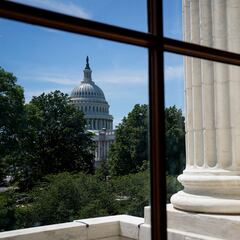Social Security: Why could benefit payments be late in July 2023?
Millions of Social Security recipients could see delays in their monthly payments for the month of July. This is related to talks on the US debt ceiling.

Every month, the Social Security Administration issues millions of payments to recipients of the insurance program, which are mostly retired workers or disabled people belonging to SSI or SSDI.
Payments are issued on a weekly basis, based on the date of birth of the beneficiaries. However, for the July payments, recipients could see delays in their deposits if Congress and the White House do not reach an agreement on raising the debt ceiling.
Social Security: Why could benefit payments be late in July 2023?
The debt ceiling is the limit of money that the Federal Government can borrow. The last time the country raised the debt ceiling was in December 2021, when Congress gave the green light to an increase of $2.5 trillion dollars, resulting in a total budget of $31.4 trillion dollars.
The White House is currently seeking Congress to authorize another increase; however, lawmakers, mostly Republicans, refuse to raise the debt ceiling unless spending is cut. The Biden Administration and Congress have until June 1 to reach an agreement; otherwise the US would face its first default.
READ ALSO: Minnesota changes laws to support disabled workers
*BIDEN SAYS U.S. DEBT CEILING TALKS ARE MOVING ALONG AS WHITE HOUSE AND REPUBLICANS START TO SHAPE DEAL https://t.co/R2oUqlOL5G
— Investing.com (@Investingcom) May 13, 2023
🇺🇸🇺🇸 pic.twitter.com/b8ufWacUA1
Not raising the debt ceiling would have huge consequences for the country. Without receiving more money, the government would be forced to cut spending, including monthly Social Security payments. By cutting SSA spending, beneficiaries could see delays in their payments.
READ ALSO: Spouses can claim SSDI benefits too
Other effects of the debt ceiling
Related stories
Social Security beneficiaries would not be the only ones affected, but also those who have Medicare, those who receive payments for being veterans and government workers, including military personnel.
If we defaulted on our debt, the middle class would hurt.
— President Biden (@POTUS) May 10, 2023
8 million jobs lost.
Social Security and Medicare payments could be halted or delayed.
Retirement accounts would be hit.
Costs would go up.
It's time to end the gamesmanship and get to work. America pays its bills.
Added to this, the lack of money would also cause some non-essential government agencies to close temporarily.


